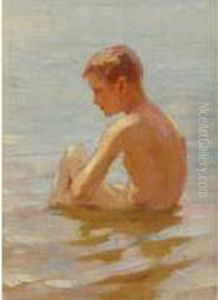Bogdanov Belskiy N. Petrovic Paintings
Nikolai Petrovich Bogdanov-Belsky was a distinguished Russian painter and teacher, born in 1868 in the village of Shitiki, in the Smolensk Governorate of the Russian Empire (present-day Russia). He grew up in a peasant family, which influenced much of his later work, focusing on rural life, children, and education. Despite the humble beginnings, his evident talent led him to the Imperial Academy of Arts in Saint Petersburg, where he studied under the guidance of prominent artists like Arkhip Kuindzhi and Ilya Repin.
Bogdanov-Belsky’s artistic journey was deeply intertwined with the social and cultural milieu of his time. After his studies, he became a part of the Peredvizhniki (Wanderers) movement, a group of Russian realist artists who sought to engage with the public on social and moral issues through traveling exhibitions. His works often depicted the idyllic countryside, scenes of peasant children learning, and the serene beauty of Russia’s landscapes, embodying the ideals of the Peredvizhniki in both theme and spirit.
During his career, Bogdanov-Belsky enjoyed considerable success and recognition. He became a member of the Imperial Academy of Arts and participated in numerous exhibitions, both in Russia and abroad. His paintings were celebrated for their technical skill, emotional depth, and the artist’s ability to capture the subtleties of light and atmosphere. Notable works include “Spellbound by the Sunset,” “At the Door of the School,” and “Mental Arithmetic. In the School of S. A. Rachinsky,” which reflect his enduring interest in education and the intellectual development of children in rural settings.
In the aftermath of the Russian Revolution, the changing political and social landscape led Bogdanov-Belsky to relocate to Latvia in 1921, where he spent the remainder of his life. During these years, he continued to paint, though his later works often carried a sense of nostalgia and longing for the Russia of his youth. Nikolai Petrovich Bogdanov-Belsky passed away in 1945 in Berlin, leaving behind a legacy that continues to be celebrated for its poignant representation of Russian life and culture during a period of significant change.
